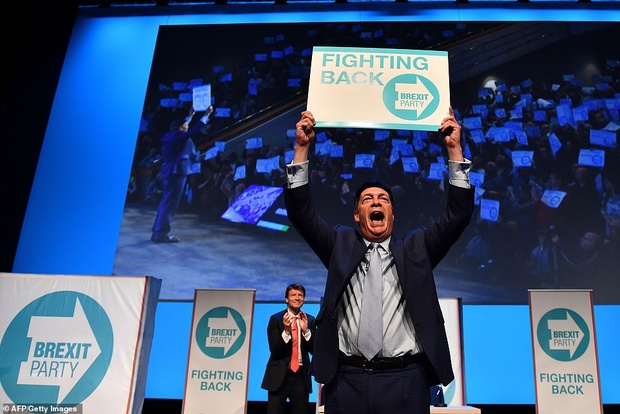
Let's start with some simpler questions. Why did Nigel Farage step down from Ukip, ostensibly in protest over its 'extremist' direction? It was, surely, a successful brand. Why did he ask his loyalist Catherine Blaiklock to found and lead a new party, rather than doing it himself? Why did he initially insist that it was entirely Blaiklock's idea, while he now cheerfully takes credit for it? Why, in short, did Farage need a new political vehicle, when every single one of its MEPs was a UKIP MEP just a few months back? And what sort of vehicle is it?
At face value, the Brexit Party is an emergency, single issue vehicle. It has no declared programme. According to Farage, it will not declare a programme until after the European elections. It has no democratic structure. Strictly speaking, it has no members. You can sign up to be a 'registered supporter', but as yet this comes with no rights. The party's constitution holds that the leader can only be deposed by a vote of no confidence on the part of a board appointed by the leader. If there is to be a policy discussion after the election, it will be conducted by Farage, Richard Tice and the leadership-appointed board. The 'grassroots' can share content on social media, attend ticketed events at which Farage speaks, and apply to be candidates, but that's it.
In the immediate aftermath of Brexit, Arron Banks and Nigel Farage each spoke of the possibility of a post-UKIP organisation. Something without the laboriously democratic, membership-based structures, not to mention internal factions and power struggles, of UKIP. A networked party, something like the Five Star Movement. Almost three years on, and that project has borne fruit. As Farage recently put it:
"I've watched the growth of the Five Star Movement, from its inception, with absolute fascination. The genius of setting up this new way of doing politics, an online platform... and, hey, look at what we're doing. Look at what we're already doing in four weeks, we're doing the same kind of thing."
This is the Digital Party, of which Paolo Gerbaudo has written. In a way, it's less a party than a new form of company, like a venture capitalist-funded start-up. It emulates the platforms, engaging people neither as consumers nor as a demos, but as carefully administered and manipulated data points. And it is incredibly data-hungry. It elicits 'engagement' and 'feedback', and it is possible that, as with the Five Star Movement, the Brexit Party will even evolve some plebiscitary forms of 'direct democracy'. But all of it will be built around the central authority of the charismatic leader, and his emotional relationship with his supporters.
One thing that the online platform party is terribly good at it, is gaming the social industry. As we, and they, have learned from Trump, one does't need a detailed policy agenda when one knows how to manipulate the volatile attention flows of new media. You make sure you say and do things that the media can't not report on. You carefully script 'throwaway' remarks, or 'eccentric' campaigning choices. You make a professional operation look like it's a seat-of-its-pants, barely-hanging-together jumble, always tremulously on the brink of collapse.
To give an example of how this works, one of the Brexit Party's major media strategies is to accentuate its apparent novelty: its defiance of left-right conventions above all. Now, this story is absolute bollocks. The Brexit Party is a small, far-right enterprise, with some Tory funders and right-wing newspapers backing it, whose MEPs are all ex-UKIP, and whose personnel are the usual fash-curious flotsam. And even this bollocks story is not new: UKIP pretended to be 'neither left nor right' for a period of time when Farage thought he was going to win Labour seats. Many journalists and academic bought it at the time. So, how to put a shine on this ordure? The answer was smart. Get the Koch brothers-funded Sp!ked chancers on board. They knew it would be impossible for the media to resist pointing out that these reactionaries were once known as the Revolutionary Communist Party. Job done. How could anyone doubt their diversity when they have even opened their doors to 'communists'?
There is thus a real danger of capitulating to the mystique of such organisations, while appearing to criticise them. Labour's strategy in the European elections, has been to define itself as the anti-Farage party, the party to "bring our divided country back together". Now while this is rooted in Corbyn's formally correct analysis that a culture war between Leavers and Remainers is stupid and will only benefit reaction, it is a questionable strategy. Far from offering a militantly left-populism to combat Farage's right-populism, it looks anodyne, completely contrary to the insurgent spirit of 2017. The country doesn't want to be brought back together, and Corbyn shouldn't want to be the sort of politician who could bring it together. Besides, as much as Farage is a danger, it's really not a good idea for Labour to be talking up the polls which give the Brexit Party a lead. Those polls are a perfect example of how the media can be gamed, because they are picking up on short-term trends, surges of media attention and interest, which then go on to justify further interest. For that reason, any predictive value they have is limited to this: they might become a self-fulfilling prophesy.
If we want to ensure that the collapse of the Tories does not result in an Italian-style upsurge of far-right and farther-right parties based on digital networks, circuits of rightist 'influencers', Youtubers, business funders, street-fighting outriders, and so on, we will need to learn new tactics. In particular, we will need to accumulate some savoir as regards the social industry and the kinds of politics it generates. We will need to learn how to oppose without fuelling the attention cycle, or without ourselves being gamed.
